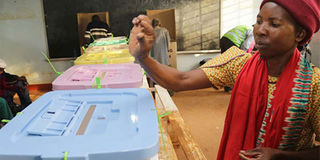Voters, albeit on a small scale, are looking for authentic politicians

A resident casts her vote at Ratta Primary School in Seme, Kisumu County on August 8, 2017. Voters, albeit in a small way, are looking for authentic politicians. PHOTO | TONNY OMONDI | NATION MEDIA GROUP
What you need to know:
Many saw Sonko as intellectually unfit and temperamentally unqualified to be anywhere near public office, let alone being the Governor of Nairobi.
Because of his unscripted and unorthodox style, Sonko has generated plenty of animus. Some of which is valid.
Sonko is part of a small, but growing number, of urbanised and de-ethnicised politicians.
Despite being considered notoriously ethnic “slaves”, who vote for a politician largely based on their ethnicity, average Kenyan voters are smarter than acknowledged.
In the 2017 elections, 62 per cent of MPs, 79 per cent of Woman Representatives, more than a half of Governors (25 out of 47) and two-thirds of MCAs lost their seats.
After frustratingly and seemingly endless cycles of replacing one conniving politician with another, voters, albeit on a small scale, are looking for authentic rather than “plastic” politicians.
In the August 8, 2017 election cycle, Boniface Mwangi — a photojournalist-turned-activist and now politician, and Mike Sonko Mbuvi — the bling bling all-action Nairobi Senator, represented authenticity, off course, of a different kind.
If Sonko’s selling point is dishing out handouts instead of developing concrete policy interventions, Mwangi sold a future anchored in a corruption-free servant leadership.
NAIROBI ELITES
While Sonko was elected the Governor of Nairobi, Mwangi lost the Starehe Constituency MP’s seat to the eventual winner Charles Njagua Kanyi, a musician-turned-politician, popularly known as “Jaguar”.
However, many Nairobi elites were more frustrated with Sonko’s victory than Mwangi’s loss.
This elite middle class are incapable of realising that the electorate are tired of kizungu mingi politicians, and they would rather vote for an authentic Sonko than a suited politician.
To the middle class that inexplicably views itself as the arbiter of good taste in everything, but especially politics, this line of thinking does not particularly make a great deal of sense.
They think because of their socio-economic status, their votes weigh more than Wanjiku’s.
UNFIT
Except for a few nuanced ones, many saw Sonko as intellectually unfit and temperamentally unqualified to be anywhere near public office, let alone being the Governor of Nairobi.
Unsuccessful independent candidate Miguna Miguna epitomised this attitude when, during a televised Nairobi Governor candidates’ debate, he accused Sonko of being incapable of spelling the word “governor”, as if politics was a spelling bee competition.
Because of his unscripted and unorthodox style, Sonko has generated plenty of animus. Some of which is valid.
However, animus alone is not enough if not backed by a solid plan and candidates.
The middle class, however, considers politics as self-operating abracadabra, and “good” candidates get elected. This mindset has deepened post-2010 Constitution: We have a good Katiba, therefore, good candidates will automatically get elected. But electing “good” candidates requires hard work — mobilising and organising. This is something the middle class has abandoned.
RESONATE
Amid all the anger directed at Sonko, no one questions what makes Sonko’s style resonate with the voters.
Nothing unites Kenyans in collective outrage than corruption and ethnic-driven politics. Sonko does not pander to his ethnic base, a currency in Kenya’s politics, to win votes.
But the same middle class inescapably backs a politician from their ethnic group, while directing bile towards politicians like Sonko considered too “rough” for their taste.
Sonko is part of a small, but growing number, of urbanised and de-ethnicised politicians.
TOLERANCE
Before the August 8 election, plenty of Nairobi residents were unsure, and some even conflicted, over who they will elect as governor.
Sonko was “unfit and unlearned”, independent candidate Peter Kenneth was “uninspiring”, incumbent Evans Kidero was a “failure” and Miguna was “cantankerous”.
Nairobians have a wider tolerance for politicians.
Their standard is too low, that, all Kidero should have done was ensure garbage was collected on time, and they would have gladly voted for him.
To ingratiate himself to the voters, Sonko’s first act, even before he was sworn in, was to initiate cleaning of the city using his Sonko Rescue Team.
HYPOCRISY
Someone once quipped, the only thing worse than a liar is a liar that’s also a hypocrite!
This quote came to mind when the same voters who lament Sonko’s victory have done little to ensure Mwangi was elected — another reminder that the middle class is not willing to put their money and time where their collective mouths are.
If they had put in time, especially weekends and evenings, to knock on doors, ask people to come out and vote, contributed more money, Mwangi’s campaign would have adequately gone toe to toe with the other well financed campaigns, and possibly elected.
The gulf between the voters and the middle class, just like the suited politicians, is growing, but they are headless.
As long as the only thing the middle class brings to the table after the elections is righteous indignation, Sonko and his ilk will continue to be elected, while people like Mwangi will continue to lose, and the best the middle class can provide is lamentation.
That is not a plan.
Mr Abdullahi is a commentator on security and governance




